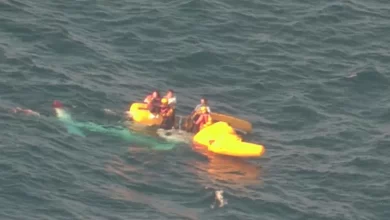Brussels focuses on curbing departures and speeding up returns in its migration proposal after Paris and Rome’s standoff

The European Commission has focused on Monday its proposed action plan to contain the open pulse between France and Italy for the rescue and disembarkation of migrants in the central Mediterranean on taking more measures to curb irregular departures and expedite deportations to countries of origin, since, in its view, most cases are due to economic migration and are not eligible for international protection.
“When you look at the nationalities of those who arrive, many simply want to come and save some money. They just want to be part of our labor market and we need them in our labor market, but we don’t want them to come in this way,” Interior Commissioner Ylva Johansson told a press conference to present the key elements of her “Central Mediterranean Action Plan”.
“A significant majority of those arriving are not in need of international protection. They arrive from Libya but are predominantly from Egypt, Tunisia and Bangladesh,” she said.
The package consists of about twenty measures, most of them already existing or proposed in the reform of migration and asylum policy that the EU has been negotiating for several years, but seeks to resolve some “gaps” that complicate the management and control of one of the routes most used by those trying to reach the European Union, but also “one of the deadliest”.
However, after the crisis opened between France and the new far-right government of Italy, which refused to authorize the landing of more than 200 migrants aboard a ship of the NGO SOS Mediterranée despite its ports being the nearest safe place, led Paris and Brussels to pressure the rest of the bloc to convene an extraordinary meeting at the level of ministers.
The EU interior ministers will finally meet this Friday 25 in the European capital to discuss common solutions on “all migration routes”, according to the official call, although the extraordinary meeting will focus on the action plan presented by Johansson.
As it did during the weeks in which Italy refused to receive the SOS Mediterranée boat, the Community Executive has reiterated on Monday through its Commissioner for Home Affairs that it is a legal obligation for Member States to provide assistance to migrants at sea and ensure their safety, “regardless of the circumstances that led them there”.
“The legal obligation to rescue and ensure the lives of these people is clear and unequivocal,” said Johansson, who has insisted on “stressing that saving lives is always the first obligation” as far as the EU’s position on migration is concerned.
But the commissioner added that the situation in the central Mediterranean at the moment poses “many challenges” and also referred to the “lack of clarity” that still exists regarding the role of private vessels that assume rescue tasks in the region.
In this context, he called for “greater cooperation” between all the actors involved, from the Member States to the NGOs, including rescue authorities and international agencies, while recalling that the EU Migration Pact being negotiated also includes a sort of “code of conduct” for private vessels.
In any case, Johansson explained that the action plan that he will defend before the ministers is based on three fundamental pillars, the first of which is aimed at strengthening cooperation with third countries and international organizations to reinforce border control and combat the mafias that traffic in people.
On this point, for example, Brussels proposes to strengthen the means available to Tunisia, Egypt and Libya to improve surveillance of its border and contain irregular departures and also “strengthen the diplomatic commitment on returns” to expedite deportations, while “enhancing legal channels” to reach the EU.
Secondly, the Community Executive calls for better coordination on rescue between Member States but also countries with other actors such as Frontex, UNHCR or the IOM through the Contact Group for search and rescue whose creation is proposed in the framework of the Migration Pact.
The third key of the proposal of the community services has to do with strengthening the implementation of the voluntary platform for the relocation of migrants in EU countries, an initiative signed by more than a dozen countries, including Spain, but which has only allowed the transfer of a symbolic number of people so far.







